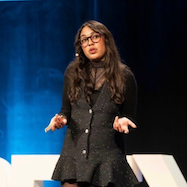
Marcy Ericka Charollois
Biography
I'm Marcy Ericka, a social tech UX writer, content strategist and
former editor-in-chief of WeLoveDevs. I was the first woman hired there, racialized and LGBTQIA+.
I realised that few people like me are represented in tech: I chose to take a more committed stance to promote inclusion at any cost.
Previous events
NewCrafts Paris 2023
Racism fuels users experiences : why you should understand the strength of biased narratives.
Talk
Failing facial recognition, assimilation of black people to gorillas on Google, confusion between shadows and dark skin tones by smart cars to the point of being hit… Racism in the user experience can sometimes manifests itself in a spectacular way.
However, it is not only in these examples that racist biases exist: they invite themselves into what we all produce in an insidious way.
From design to implementation and into the use of products: without taking a step back, we can harm and create the exclusion of certain groups by perpetuating or even amplifying inequalities.
It is also within companies, and therefore among industry employees, that we find misunderstandings that oppose and discriminate the most marginalized population.
So, how do we guarantee neutral or universal experiences in a world where the UX is intended to be optimal and inclusive for everyone?
I want to share with you a multi-faceted approach to solving systemic problems in the user experience, from semantics to personae, via personal stories and through History with a capital H.






